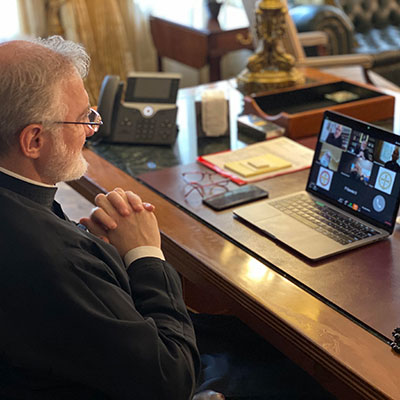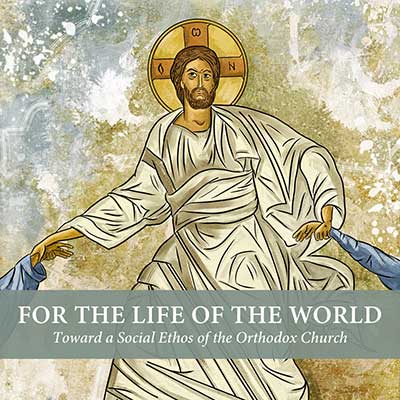Mark, Bishop of Arethusa
Saint Mark was Bishop of Arethusa in Syria. In the days of Saint Constantine the Great, Saint Mark, moved with divine zeal, destroyed a temple of the idols and raised up a church in its stead. When Julian the Apostate reigned, in 361, as the pagans were now able to avenge the destruction of their temple, Saint Mark, giving way to wrath, hid himself; but when he saw that others were being taken on his account, he gave himself up. Having no regard to his old age, they stripped him and beat his whole body, cast him into filthy sewers, and pulling him out, had children prick him with their iron writing-pens. Then they put him into a basket, smeared him with honey and a kind of relish of pickled fish, and hung him up under the burning sun to be devoured by bees and wasps. But because he bore this so nobly, his enemies repented, and unloosed him.


 His Eminence Archbishop Elpidophoros of America held a Virtual Town Hall with the Metropolitans of the Eparchial Synod, the Bishops, and over 325 members of the National Clergy, organized by the Archdiocese Presbyters Council (APC), in order to discuss the magnitude of the Pandemic crisis and took questions from the clergy.
His Eminence Archbishop Elpidophoros of America held a Virtual Town Hall with the Metropolitans of the Eparchial Synod, the Bishops, and over 325 members of the National Clergy, organized by the Archdiocese Presbyters Council (APC), in order to discuss the magnitude of the Pandemic crisis and took questions from the clergy.
 For the Life of the World presents a way of reaching out across social distancing at a time of global calamity – as our faithful are either self-isolated and quarantined (a term that literally refers to a period of forty days and reflects the church’s struggle during Great Lent) – in order to address the role of the Church at a time of spiritual crisis, challenge, and concern.
For the Life of the World presents a way of reaching out across social distancing at a time of global calamity – as our faithful are either self-isolated and quarantined (a term that literally refers to a period of forty days and reflects the church’s struggle during Great Lent) – in order to address the role of the Church at a time of spiritual crisis, challenge, and concern.
 Freedom of movement and freedom of association are being reasonably restricted, as we seek to slow the spread and preserve the health of our communities. Thus, we must remember that our most precious liberty is that of conscience, our God-given right to think and believe freely. This freedom of the inner person can never be taken away by any external conditions.
Freedom of movement and freedom of association are being reasonably restricted, as we seek to slow the spread and preserve the health of our communities. Thus, we must remember that our most precious liberty is that of conscience, our God-given right to think and believe freely. This freedom of the inner person can never be taken away by any external conditions.